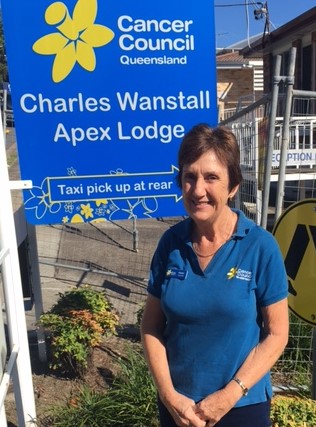Meet hospital-based and lodge volunteer, Helen Atkinson.

It’s a special moment in the day, one many patients look forward to, perhaps relieving the boredom, or the chance to see a friendly face and have a chat or share some fears about their future.
This is the special role Helen Atkinson plays in many lives as both a hospital-based and lodge volunteer at our Charles Wanstall Apex Lodge in Brisbane.
My hope for the future is that every patient receiving cancer treatment knows about the practical and emotional services Cancer Council Queensland can provide to help them. – Helen Atkinson
Close to going on an overseas trip with her daughter, Helen was diagnosed with breast cancer after a regular mammogram in 2013. With no history of cancer in her family and having always been proactive about health Helen felt overwhelmed by the diagnosis and bombarded with tests and information about what was happening.
Helen resigned from her job, so she could face what the surgeon described would be a ‘torrid year.’ Taking a one step at a time approach she listened to all advice and learned how best to help herself through treatment and recovery. Trying not to push beyond what her body was telling her.
Joining a support group was of enormous psychological benefit during the 18 weeks of chemotherapy and 5 weeks of radiation therapy. And now, five years later, is one of the reasons why Helen volunteers with Cancer Council Queensland.
“I want to help as many cancer patients as possible, so they know about the practical and emotional support services they can access through CCQ.”
The second reason is to support patients form rural and regional areas. Hearing their stories over morning tea at the Lodge leaves Helen impressed by the generosity of human spirit in the community.
“I meet people who live a long way from Brisbane but need to be here for weeks at a time for daily treatments. The grass still grows on their lawns, their animals still need feeding, their business’s need to keep going to pay their bills, and they can’t be at home. They are unwell and often need someone looking after them in Brisbane. But inevitably, family, old friends, or neighbours, step up, and carry the load at home.”
“It’s inspiring to meet some patients again when they return for check-ups. I’ve spoken with them when they started treatment and didn’t know what to expect, supported them when the treatment knocked them around a bit, and met them again when they come in for a check-up looking much better.”
Helen finds her roles providing morning tea for residents at Charles Wanstall Lodge and visiting patients at the Royal Brisbane Women’s Hospital complement each other well.
“I sometimes meet patients in the hospital who will be going from hospital to the Lodge. I can answer their questions and hopefully ease their worries a little. On the other hand, I meet patients in the hospital who have been staying at the Lodge, so I am a familiar face to them if they have attended a morning tea.”
The morning teas offer a chance for residents and carers to meet, often becoming a support to each other as they progress through treatment. Among other things, they share recipes as taste buds may change during treatment, and ideas of how to fill in the weekends. Helen then takes the opportunity to make sure they know about the many support services Cancer Council Queensland has available.
Helen has made lasting connections with other volunteers and knows she can reach out to the Cancer Council Team for support if necessary.
“The training I received as a volunteer has really helped me separate the support I’m giving to patients from my own circumstances … if I find a visit very emotional, I know it’s okay to have a break.”
Every day, we’re working hard to ensure that no Queenslander faces cancer alone. With the ongoing support and generosity of the community we can continue to do this.
